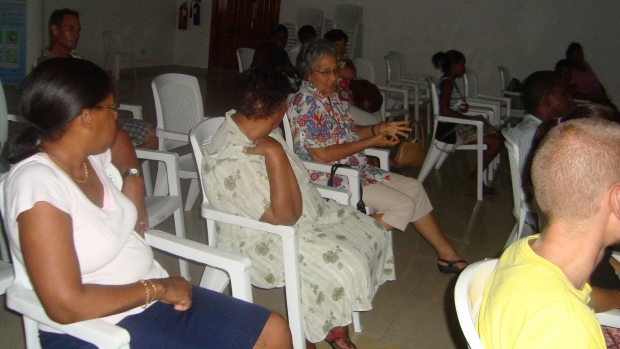Grants :: Large Grant Facilities :: Coastal development and ecosystem modelling as a tool to enable improved local and national policy and decision-making processes
Coastal development and ecosystem modelling as a tool to enable improved local and national policy and decision-making processes

Community member in Takamaka district discusses development ... , Seychelles © MFF Seychelles, 2012
Objectives
The main objective of the project is to "Strengthen the technical and scientific basis of, and empower local community involvement in, coastal management decision making‐processes".
The project has 2 clear immediate objectives:
1. Develop and mainstream a set of technical tools to enable informed coastal management decision‐making; and
2. Empower local community involvement and influence on coastal management decision-making.
Background
This project has been developed within the policy context of both the principle environmental policy document of Seychelles and the MFF National Strategy and Action Plan.
This project seeks to establish a baseline and context for the development, assessment and approval of coastal development in local communities. Coastal development in Seychelles takes place across a full spectrum of scenarios from relatively untouched and unpopulated areas with high
biodiversity interest and environmental service value to densely populated and highly developed areas. This project will divide the Seychelles coastal development continuum into logical categories as defined by their biotic, physical and socioeconomic characteristics. This categorisation will provide a context and parameters within which specific development proposals can be reviewed and enabe an objective assessment of the likely impacts of any specific development or activity.
Target beneficiaries
Communities and local government agencies of the four project sites (Beau Vallon Baie, Mahe; Anse Intendance, Mahe; North Island; Denis Island).
Outputs
The intended outputs are embodied in the project's expected results:
- Pilot project sites surveyed for biotic, physical and socioeconomic characteristics.
- Environmental and Socioeconomic baselines and parameters established.
- Coastal assessment toolkits/manuals for technicians and coastal managers developed.
- Public education materials developed.
- Stakeholders are utilising toolkits and materials in coastal management processes.
- National public media outlets and other communication format have effectively covered the project and furthered its objective.
The two core outputs of the project are the coastal assessment toolkits and the public education packs on the coastal management cycle.
Country
Location
Beau Vallon Baie, Mahe; Anse Intendance, Mahe; North Island; Denis Island
Topic
- Knowledge for Management
- Economic Valuation
- Civil Society Engagement
- Integrated Coastal Planning
- Management Assessment and Monitoring
- Private sector partnerships
- Knowledge management and communications
Duration
1st Aug 2010 to 30th Jul 2012
MFF Grant Amount
USD200,000
Co-financing Partner
National project partners include the Marine Conservation Society Seychelles (MCSS), the Green Islands Foundation (GIF), the Department of Environment (DoE), the Ministry of Community Development (MCD), Ministry of National Development (MND) and the Seychelles Chamber of Commerce and Industry (SCCI).
Partners also include the governmental agencies with portfolio responsibility for the issues covered by the action.
DoE is the Government agency with portfolio responsibility for environment and in particular the enforcement of the Environment Protection Act (1994) and its Environmental Impact Assessment regulations (1996).
MCD is the Government agency with portfolio responsibility for Local Government. The country is divided into 25 districts‐ 22 on Mahe, 2 on Praslin and 1 covering La Digue and the outer island communities. MCD operates a District Administration Office in each district, each run by a District Administrator (DA) and his/her staff. The DA is the focal point for local community interaction with central government and serves as two way conduit for government initiatives, grass roots up and top down.
MND is the Government agency with portfolio responsibility for Land Use Planning and in particular enforcement of the Town and Country Planning Act (1972) and the chairing and operation of the Planning Authority instituted under the Act.
SCCI is a registered association that represents the business community in many national fora. It has a strong membership of almost 200 businesses from all economic sectors and hence is considered as representative of the country’s private sector.